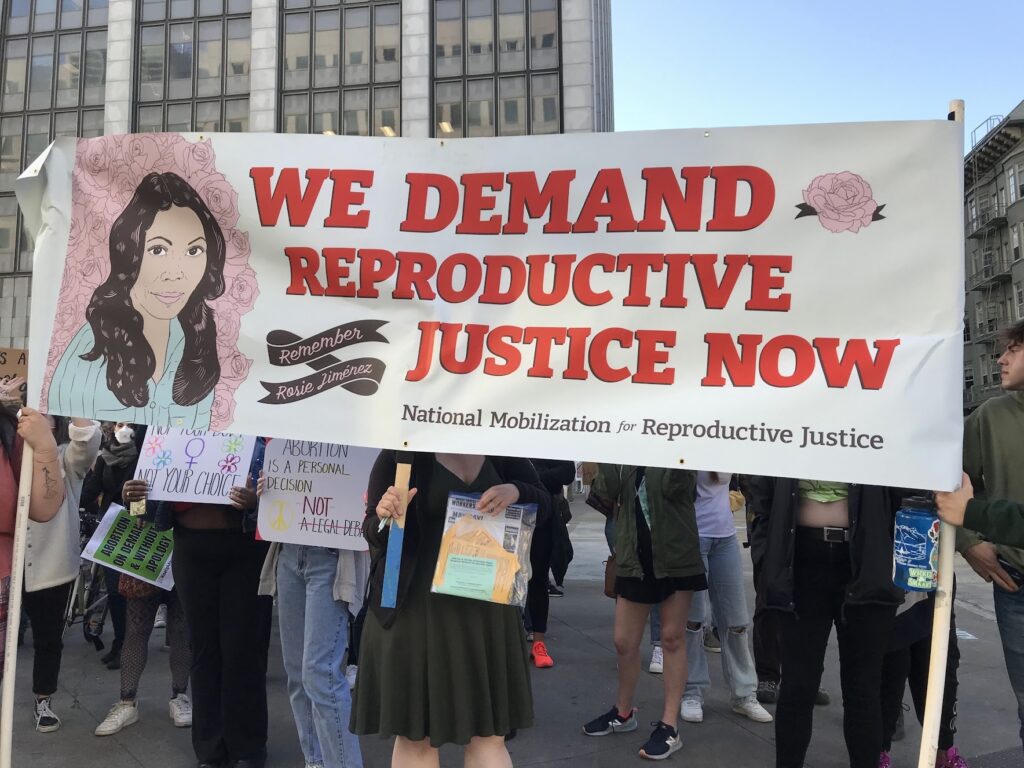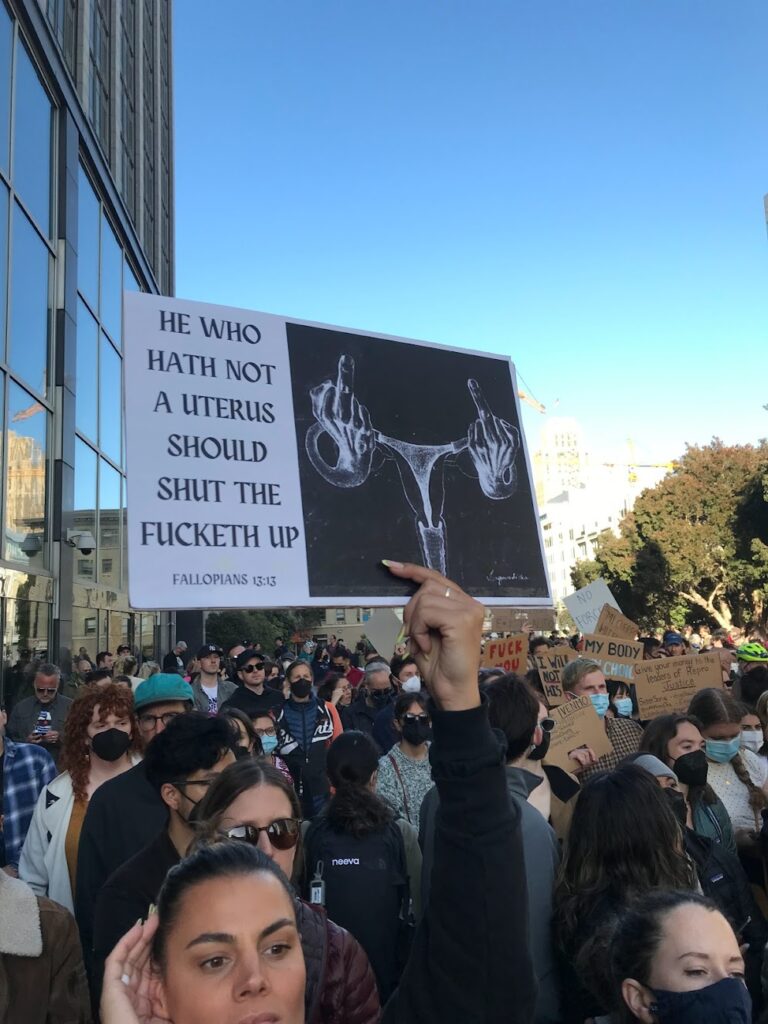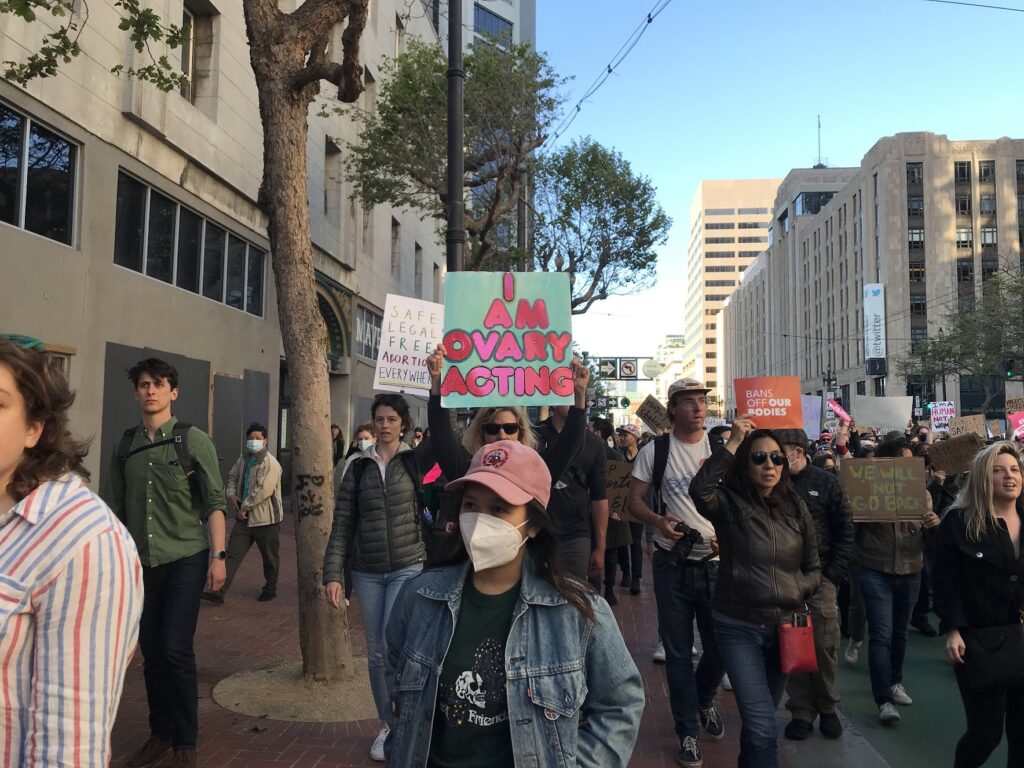You are long past the days when you found yourself at 2am saying, or shouting, at a computer screen, “Wait, what?!”
Your boss has told you that she deeply admires your hound-dog, investigative instincts, but declares—with COVID cases on the wane and the company’s BIO (back-in-office) policies reinstated—it is no longer fashionable when the staff meeting commences at 9am to be at home, still in your pajamas, buried under a laptop, lapping up every article, post, rant, rave, and dribble you can find about the recent SCOTUS Roe v. Wade opinion draft leak.

For these conditions and if your “must do something” appetite has at last risen to feverish levels…you have options. So many options that for purposes of brevity and to eclipse a torrent of recommendations for action, we highlight two organizations that represent a tiny fraction of the possibilities for civic participation in the Bay Area.
This is not to suggest the Raging Grannies Action League or National Mobilization for Reproductive Justice movement, initiated by the international and national socialist feminist organization Radical Women, are tiny operations, or, that their visionary work is anything less than vital.
Instead, the two organizations are host to multigenerational worldwide participants with established histories in the ongoing pursuit and protection of reproductive justice. As such, they offer local chapters and the possibility of participation in marches, rallies, legislative advocacy, informational workshops and summits, as well as organizational tools for conducting grassroots reproductive justice gatherings and resources such as links to information about recent judicial and government action related to Roe v. Wade, privacy and the 14th Amendment, cases being considered by the Supreme Court, states with “trigger” laws ready to restrict or eliminate choice when it comes to reproduction (should the Supreme Court overturn Roe), and more.
Norma Gallegos is the coordinator of National Mobilization for Reproductive Justice in San Francisco. In an interview, she says, “The most impacting thing we’re doing now is giving angry folk upset about things coming down the pike the space to say there are other issues that need to be addressed in addition to protecting women’s choice.”
Gallegos says the group also works to end medical racism, defend queer and trans families, eliminate the Hyde amendments that make an abortion seeker provide the funding for a procedure and treatment and not the state, and protecting sexual determination for people with disabilities. “There’s an assertion people with disabilities aren’t sexual beings and may not need to procreate. No one ever thinks of their reproductive autonomy,” she says.

The organization also takes a stance on guarantees for medically sound sex education, affordable childcare, no caged kids or forced assimilation of immigrants and most prescient, protecting and even expanding Roe v. Wade to support safe, legal abortions on demand.
In the coming weeks she says there are opportunities for everyone to join the broad-based efforts. “Wonderfully, there will be Pride in June—events like the day when they open up Civic Center and we’ll be setting up a booth. There’s also the day of the decision of the Supreme Court that we’re gearing up for a protest or celebration at 450 Golden Gate Avenue,” she says. “There will be a broader plan, but as of now, we intend to go out at 5pm that day—if the decision is announced by 12 noon Pacific Standard Time. Or the next day, if it’s later. People were up in arms after the leak occurred and we want to channel that energy. Will our voices be heard? Or, will we at that time revolt?”
Gallegos, 39, says she’s been involved in political activism since high school. “The line of work I’m in is to be involved. If people aren’t interested in joining a group, liberal feminists will tell you to sign petitions, send letters to legislatures and do those things on your own. It’s been presented by the media that it’s fine for people who want to participate in events that support inclusion to use the Internet. That’s ok, but I think collective, active, in-person participation is the best way to make the movement stronger.”
For National Mobilization and its partners and collaborators, substance, not volume, matters most in presenting their positions. “We’re making these demands (about protecting more than just abortion) because other bigger groups haven’t made them. When this draft opinion sparked our first demonstration, at least 2,000 people came out. But the quality of what we had to say stays strong: we present these other issues that need to be addressed, that need us to keep fighting beyond defending Roe. Other things need to be preserved while calling for saving Roe.”
Highly useful, she asserts, are real life examples, science-based facts and data demonstrating how restrictions placed on abortion place at greatest risk the maternal health of Black, Brown, Indigenous women, trans and queer families, low-income women and other marginalized people.

“Specifically, there have already been impacts to women of color in Texas. There’s a young woman, Lizelle Herrera, who was put in jail for conducting a self-abortion. There will be deaths, people being thrown into jail, working women who are White will be impacted, but women of color will be even more impacted.
“It will depend on the person’s medical history, but infant and maternal death rates are huge and will go up in Black families. There are a host of things associated with impoverishment that mean health care, education and access to contraceptions are impossible to access. Being objective about this being a fundamental right means adding a medical base to the conversation and is 100 percent important.”
Emphasizing that the elimination of laws protecting privacy related to abortion may blossom to touch same sex marriage, interracial marriage, and “other things on the path of a right wing, bigoted government that is set on taking those rights away,” Gallegos can’t overstate the dangerous slope foreshadowed by the SCOTUS leak. “It’s going to impact everyone, this clear White Supremacist capitalist agenda. It will get rid of those folks who aren’t necessary for their society.”
Granny Ruth, 69, quickly establishes in an interview that she and the local members of the Raging Grannies group that was founded in British Columbia in 1987 (the SF chapter launched in Palo Alto in 2001) are no less energized—and angry. Their website claims they strive “to be non-violent in all activities,” “to shock with unladylike antics” and working independently of other organizations, “to use street theater, humor, satire and props to get our message across: world peace, feminist values, social justice, and equal rights for all.” They have received attention from national media, including mentions in The New York Times, Forbes, Rolling Stones, and others.
“The leak happened and that same day we were in Oakland because there was a rally in front of the federal building. That night we stayed up all night organizing for an event at the 450 Golden Gate Federal Court building in San Francisco. There were thousands of people there on very short notice. We worked with the SF chapter of the Nation Mobilization for Reproductive Justice, the lead organizers,” she says. “We did what we always do: attending in costume, holding Raging Grannies banners.”
Ruth says most of the Grannies were alive and sexually active pre-Roe V. Wade. “That means we didn’t have abortion rights. I was in high school and I knew people who wanted to terminate their pregnancies and had to go to Japan, Mexico, and Puerto Rico for back alley abortions. Or they had to leave school and later, come back and saw those young boys who had impregnated them with new girlfriends. Many of those young women were forced to give up their babies right away after giving birth. Their lives were changed in gigantic ways.”
In the upcoming days, the Grannies she promises will rise up “organically, on the streets of the Peninsula and throughout the Bay Area.” Having marched on the streets since 2005, she says young people who’ve never spoken to what she calls “the old left” find her approachable. Make no mistake: approachable doesn’t mean passive. “We do have a lot of anger on this issue because we’re mad as hell,” says Ruth. “Many of us fought hard to have Roe v. Wade passed.”
The Grannies will not debate the scientific aspects of abortion with people who are pro-life. “We’ll tell them that if abortion is not legal, abortions won’t be gone, they will just be unsafe. Women who are in their 30s are just coming to realize that fertility treatments are at risk, not just abortions. In vitro fertilization (IVF) involves the production of multiple embryos in the woman; many are created but only some are implanted. If the moment when embryos are created are thought of as the conception of life, then embryos created in a petri dish and not implanted are equal to destroying life. If Roe falls, there will be immediate laws attempting to outlaw fertility treatments.”
Asked about protests and the efficacy of their “feet on the streets” approach, Ruth is firm. “We think that everybody needs to get on the streets. We don’t accept that accepting a no-Roe world is the only choice. The vast majority of Americans support abortion rights. People say vote, but it’s too late. We need feet on the street. Protest works. The Supreme Court justices can say they won’t be bullied, but these protests happening everywhere are not bullying. Expressing public opinion is in no way bullying.”
For more information, visit www.raginggrannies.tumblr.com and www.reprojusticenow.org








